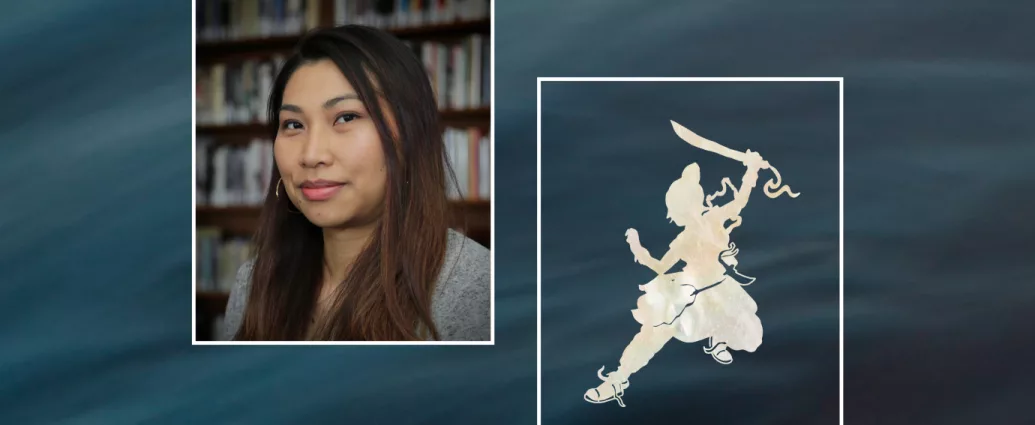An inside look at the upcoming Theater Mu production, The Kung Fu Zombies Saga: Shaman Warrior & Cannibals
WORDS BY ISABELLE WATTENBERG
When you think saga, what comes to mind? Adventure, beauty, tragedy, acts of love, acts of betrayal, beauty, and spirituality? How about some zombies? If your answer was yes, or now you’re intrigued enough to redefine what saga encompasses, well, Theater Mu is staging the play for you.
The Kung Fu Zombies Saga: Shaman Warrior & Cannibals is a vivid and complex play divided into two acts—it is also the second play in a series, with the saga’s third chapter yet to come. The production builds on and reprises playwright Saymoukda Duangphouxay Vongsay’s 2013 play, Kung Fu Zombies vs. Cannibals; the updated version serendipitously premieres on the original’s 10th anniversary, and the 30th anniversary of Theater Mu. The first act follows shaman warrior Arun as she fights to rescue her sister from zombies—who, yes, are practiced in the kung fu arts. In the second act, a Lao American woman travels from Minnesota to Laos to scatter her parents’ ashes in their now zombie-infested homeland.
Embedded in an alternate reality where zombies have ravaged the land are real practices and histories of the Lao people: This speculative world helps explore the Secret War of Laos, where thousands of bombs were dropped on Laos during the Vietnam War. As many as 80 million bombs are thought to have dropped unexploded and still lie undetected, periodically detonating and wreaking tragedy and loss. Like the bombs, the zombies provide a haunting example of the lingering and deadly effects of war and colonialism.
Duangphouxay Vongsay’s own zombie-laden dreams helped inspire the play, which grew from a short story to a full script with the assistance of Theater Mu’s first artistic director, Rick Shiomi, who connected with her at a Playwright Center reading. To navigate the balance of apocalyptic and traditional cultures, Duangphouxay Vongsay spoke with her Lao elders and arranged listening sessions with community members to absorb the intricacies of their experiences and spiritual and cultural practices. The discoveries that arose from these conversations were written into the script.
“I learned that many Laotian people believe that mental illness is like demonic possession or karma or means you’ve been cursed by someone,” Duangphouxay Vongsay says. “And I was like, I need that to be part of this work. I need to put it on stage and make people feel like it’s OK to talk about these things.”
Theater Mu also hired a cultural consultant to monitor and provide feedback on production plans and stage directions. The purpose of the collaborative work, both Duangphouxay Vongsay and Theater Mu’s Artistic Director Lily Tung Crystal explain, is for someone from a given community to see a show and see themselves accurately represented on stage.
“In many ways I consider myself a creative documentarian of our communities, just because this play talks about histories and experiences and people who weren’t included in American pop culture, in school curriculum,” Duangphouxay Vongsay says. “Not a lot of people know who we are.”
“For me as a director, we really put a lot of intention on making sure the piece represents as closely as possible the communities whose story it is,” Tung Crystal says. “I want people from that community to come to our shows and say, ‘I felt like I was in that work.’”
Tung Crystal and Duangphouxay Vongsay also align on their love of zombies.
“Saymoukda’s vision is gigantic and fabulous,” Tung Crystal says. “Saymoukda is cinematic—we always joke she should be writing for film. In theater we have to work in the confines of the stage, which is much more representational. The largeness of her vision is really exciting; however, it’s a constant conversation of how we are going to distill this for the stage.” For example, Tung Crystal says that the volume of blood (there are a lot of fight scenes) will be represented through red light—too much fake blood makes the floor slippery and dangerous. They also hired a 3D projectionist to add imaginative dimension to the scenes.
Some aspects of the play as written, however, are non-negotiable. To protect her vision and values, Duangphouxay Vongsay has written into the script a requirement that any theater company that wants to produce the play must cast Southeast Asian talent, maintaining the same strong level of representation as the premiere.
“It’s not impossible,” she says. “I’ve self-produced before, and if I, as an individual artist, can cast all Southeast Asian actors, an institution can do that…There’s really no excuse.”
WHEN YOU GO
The Kung Fu Zombies Saga: Shaman Warrior & Cannibals
July 22-August 13, pay what you can ($45 recommended)
Luminary Arts Center, 700 N. 1st St., Mpls., theatermu.org/kfz-saga
All Ages

